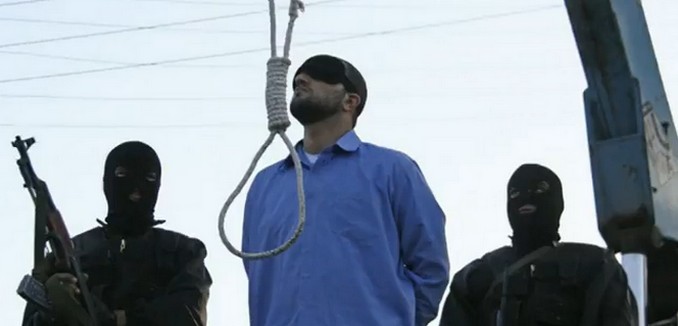Nothing subverts a cliché better than a look behind the polished façade. The Islamic Republic of Iran is a case in point. The Iranian mullahcracy has long been portrayed by supporters of the nuclear deal as a country in flux, with moderate forces slowly making their way to power at the expense of the old repressive elite.
Yet reality paints a very different picture. Just as Hassan Rouhani won the endorsement of Iran’s supreme leader Ayatollah Ali Khamenei for his second term as president on Thursday, Amnesty International published a report that rips to shreds the myth of the rise of moderates in Iran.
The organization concluded that rather than taking steps to address the abysmal human rights situation in the country, conditions have steadily deteriorated for peaceful activists under the Rouhani presidency.
“Iran’s judicial and security bodies have waged a vicious crackdown against human rights defenders since Hassan Rouhani became president in 2013, demonizing and imprisoning activists who dare to stand up for people’s rights,” Amnesty International said on Wednesday. “President Rouhani and his administration have so far failed to take any meaningful steps to stop these abuses. On the contrary, they have brushed aside reports of abuses.”
The organization detailed how scores of human rights activists—vilified as “foreign agents” and “traitors”—have been viciously prosecuted and arrested on trumped up “national security” charges, crushing any hopes of reform raised during negotiations over the nuclear détente and Rouhani’s first election campaign.
The report highlighted cases of 45 activists that were arrested and face long prison sentences for exercising their basic right to free speech, including anti-death penalty campaigners, women’s rights activists, trade unionists, minority rights activists, human rights lawyers, and activists campaigning against extrajudicial executions and enforced disappearances.
Among them are prominent human rights defender Narges Mohammadi, who led the Centre for Human Rights Defenders in Iran, an activity for which she was handed a 16-year prison sentence, as well as Alireza Farshi, a member of Iran’s Azerbaijani Turk minority who was sentenced to 15 years in prison for asking UNESCO to hold an event commemorating International Mother Language Day.
“It is a bitter irony that as the Iranian authorities boast about their increased engagement with the UN and the EU, particularly in the aftermath of the nuclear deal, human rights defenders who have made contact with these same institutions are being treated as criminals,” said Philip Luther, Amnesty International’s research and advocacy director for the Middle East and North Africa.
“Instead of appeasing Iranian officials, the EU should forcefully call for the immediate and unconditional release of all those jailed for their peaceful human rights activism,” he added.
The conclusions reached by Amnesty International should not come as a shock to anyone who has paid attention to the situation in Iran since Rouhani’s rise to power and sees Iran for what it really is: a notorious pariah state that mercilessly treats the Iranian people as its private property and exports death and destruction far beyond its national borders.
The unlawful arrest and torture of peaceful activists and ethnic and religious minorities remain common and widespread, and are practiced with total impunity. Cruel punishments such as flogging and amputations are carried out in public to create a climate of fear and obedience to the regime. Women and girls face systemic violence and discrimination with little or no protection under the law. And the death penalty—which is also meted out to juveniles in violation of international norms—is applied to a degree that it parachutes the Iranian regime into the top five global executioners every year, with 2015 marking the highest rate of executions since 1989. If that sounds a lot like George Orwell’s 1984, it is because Iran is a modern day dystopia.
That is the grim picture that emerges before a word has been uttered about Iranian complicity in the industrial-scale killing unleashed by the Assad regime in Syria with significant support of the Iranian regime and its Lebanese affiliate Hezbollah, which also holds hostage the people of Lebanon. Or the litany of war crimes against Sunni civilians committed by Shiite militia groups in Iraq, bankrolled and equipped by Tehran. And just this week, Reuters reported that the Iranians have found a new route in the Gulf to smuggle arms shipments to the Houthi rebels in Yemen, further escalating a conflict that has already morphed into one of the greatest humanitarian crises of our time.
But unfortunately, wishful thinking has clouded the judgement of many intelligent minds, who, despite overwhelming evidence to the contrary, still insist that Iran has embarked on a fundamental transition to a more human rights-oriented policy. Nothing could be further from the truth. Wherever Iran goes, it leaves behind footprints of blood.
Julie Lenarz is a senior fellow at The Israel Project and the executive director of the Human Security Centre, an independent foreign policy think tank based in London. She tweets at @msjulielenarz
[Photo: Sara Mohammadi / YouTube]




